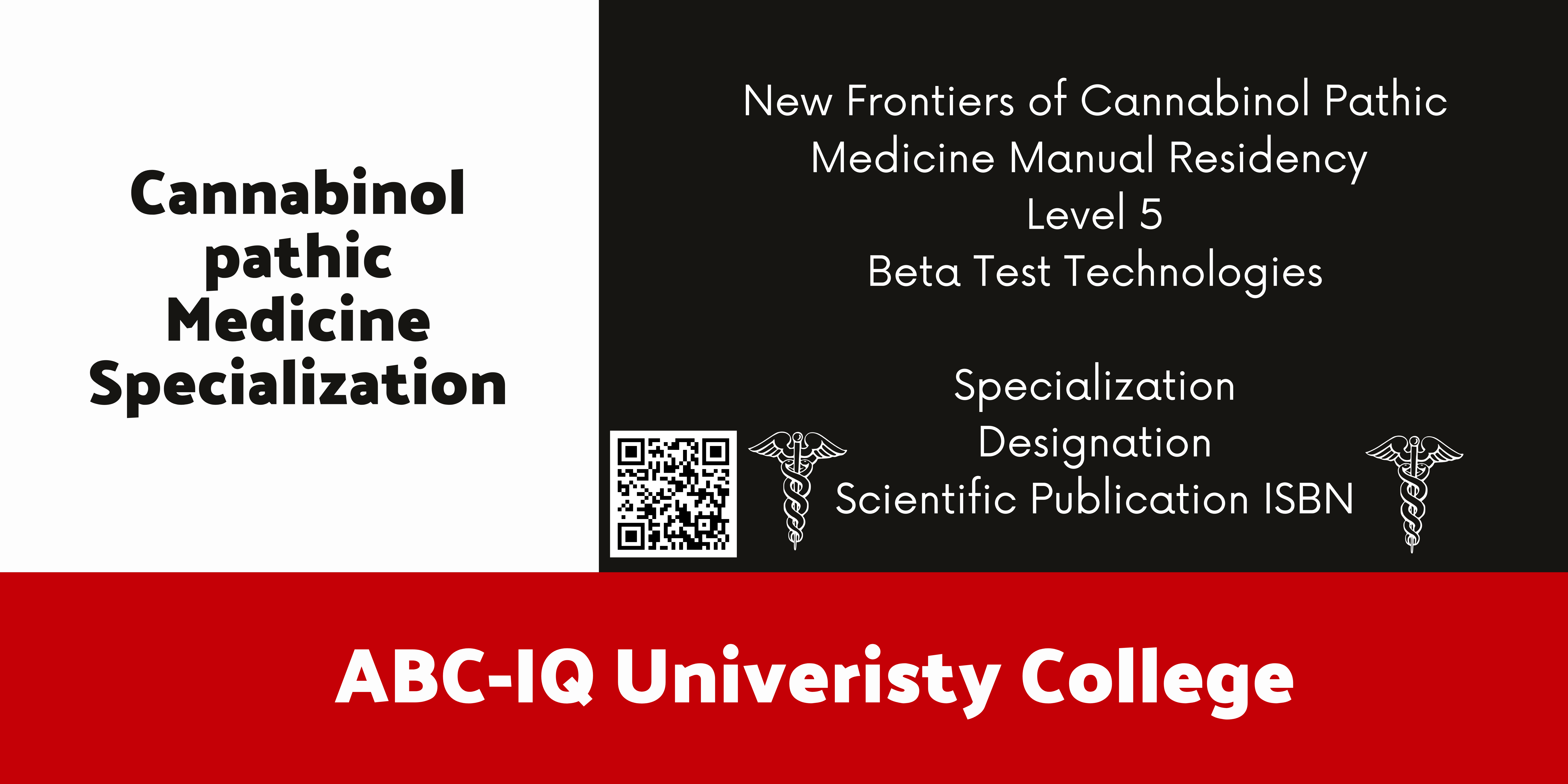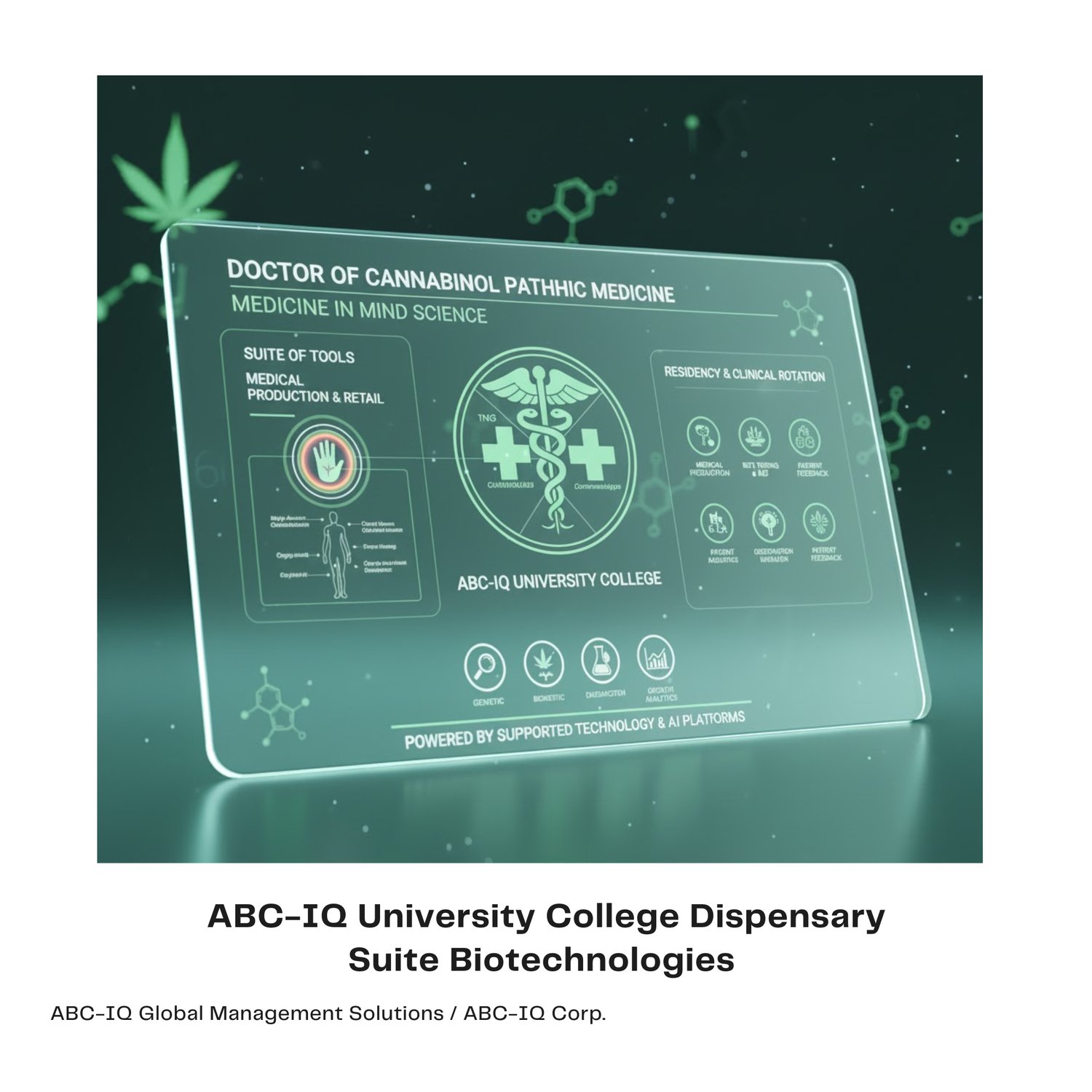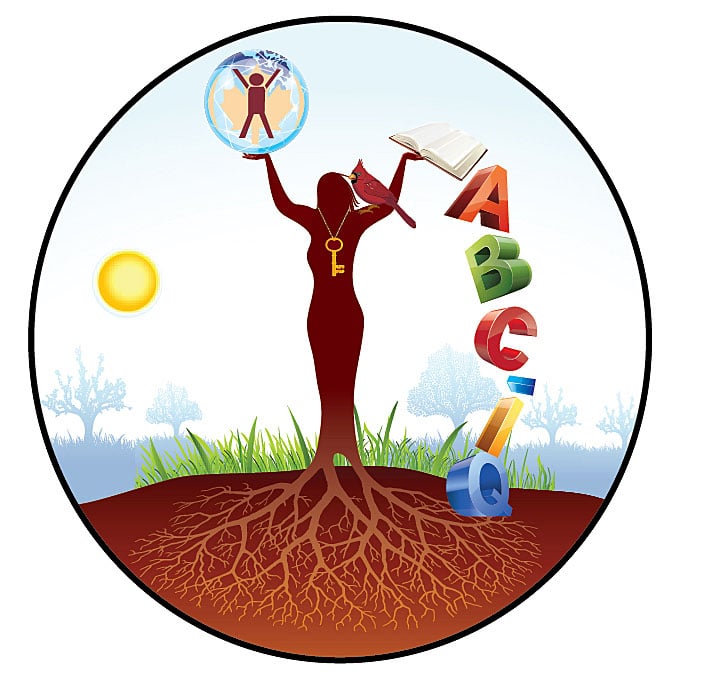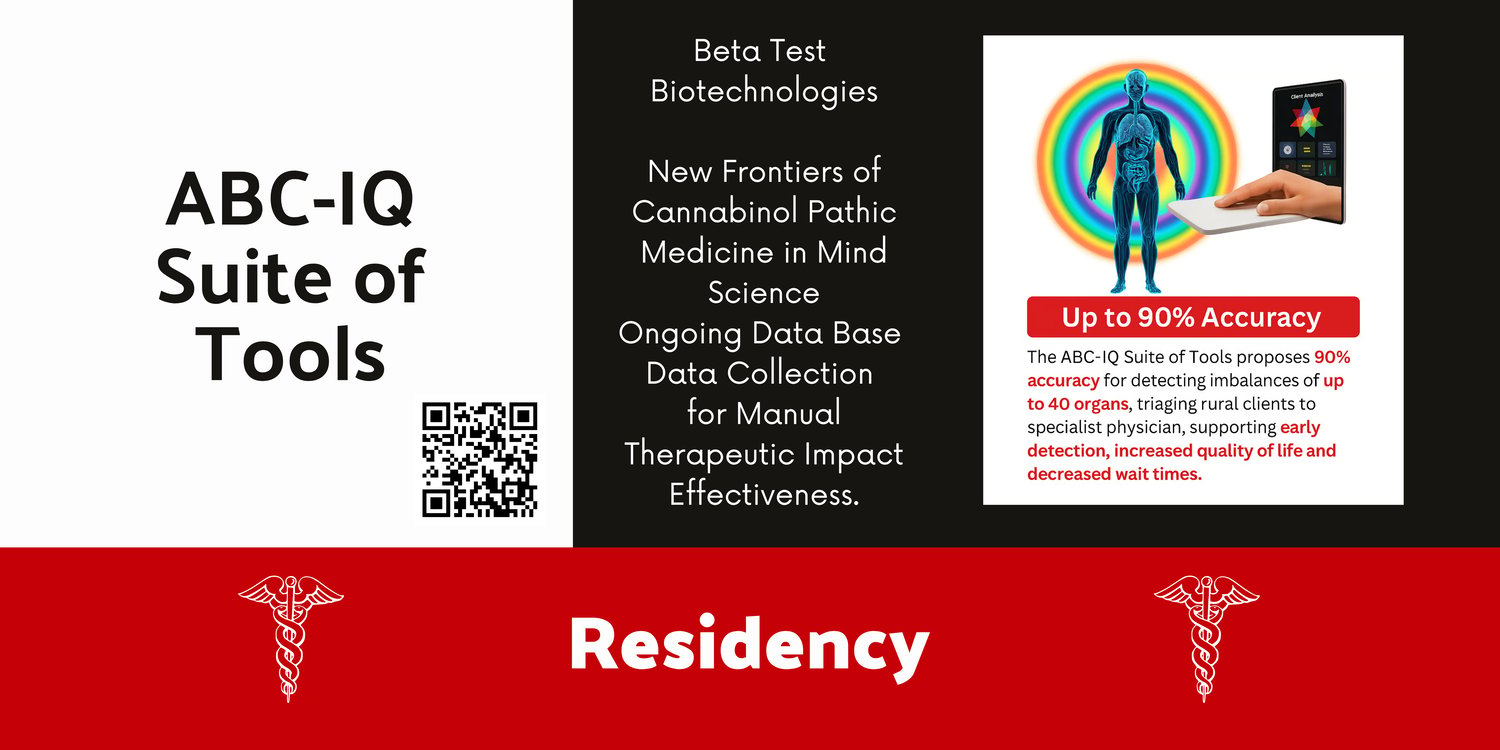Scope & Sequence


Residency Hardware Tools
Beta Testing
Note: Results are not Guaranteed and May Vary
ABC-IQ Biotechnologies
- Manual New Frontiers of Cannabinol pathic medicine in Mind Science
- Dose Guide
- Data Collection / Scan Tests Comprehensive Assessment Formulating the Global Standard
Research Strain, Dose, Impact
Software Integration
Hardware Sold Seprately

Certificate Overview
Credential Outcome
- Doctor of Cannabinol Pathic Medicine in Mind Science credential (program‑specific).
- Residency Completion Research Physician Publication
- CBD / Competency by Design Royal College of Physicians and Surgeons Canada Course Study Companion
- MCAT Course Study Companion
- New Frontiers of Cannabinol Pathic Medicine in Mind Science Manual / Data Base
- Artificial Intelligence Prompt Engineering
Residency Tools MD Preparation Suite Medical Arts & Science
Beta Testing Suite
- Ph.D. Integration Track
- Level 7 Designation: Recognition of specialization across practice, cannabis medicine, integrative health, business operations, AI integration, and publishing.
✅ In summary: Program includes seven levels: Concentration Level 2,3,or 4, Designation 5,6,7.
- Level 1 Career Core
- Level 2 Education
- Level 3 Health Care Integration (residency/apprentice)
- Level 4 Business & Operations
- Level 5 Doctor Level Specialization
- Level 6 AI Integration
- Level 7 Designation Publishing Residency Tools
- Must have completed level 1 with choice concentration, specialization with research publication.
It ensures graduates of the Doctor of Cannabinol Pathic Medicine in Mind Science pathway achieve clinical competence, business acumen, AI integration, and scholarly recognition.
🩺 Two‑Year Residency Curriculum (Integrative Health + Cannabis Medicine + Mind Science)
To practice as a specialist physician in Canada, you must complete medical school (MCAT required for entry), residency training under the Royal College’s Competence by Design framework, and pass the Royal College certification exam. CBD emphasizes competency‑based progression aligned with the CanMEDS roles, ensuring readiness for independent practice.
Cannabis and its role in Myelination
Therapeutic Impact Effectiveness
Introduction to Cannabinol pathic Medicine in Mind Science Research
Self Study
Observation Impact
Program and Courses Medical College: Research to Pactise
MD Designation Research to Practise
Preparing for certification. What to expect.
CBD Competency By Design. Medical College Admissions Test MD .
Manual New Frontiers of Cannabinol pathic medicine in mind science.
Dose, strain, impact effectiveness.
Biotechnology Diagnostics Tool+ Prompt Engeneering
🎓 ABC-IQ University College Residency Program Leading the Future of Cannabinol Pathic Medicine and Retail Science
Program Overview ABC-IQ’s Residency Program offers a groundbreaking educational pathway that merges cannabinoid science with retail and dispensary operations. Designed for aspiring physicians and cannabinoid specialists, the program prepares candidates for Royal College of Physicians and Surgeons certification while equipping them with practical skills in dispensary research, product fulfillment, and therapeutic innovation.
Core Components
- 🧠 Mind Science Manual: A foundational guide to the neurocognitive and therapeutic dimensions of Cannabinol Pathic Medicine
- 🌿 Dispensary Research Labs: Hands-on exploration of cannabinoid formulations, dosing protocols, and consumer behavior analytics
- 📦 Retail Fulfillment Training: Inventory systems, compliance, patient education, and product lifecycle management
- 🔬 Cannabinoid Therapeutics Modules: Covering pharmacology, safety standards, legal frameworks, and ethics
- 🧪 Innovation Labs: Development of plant-based therapies and translational research initiatives
- 🧭 Simulation-Based Learning: ABC-IQ’s proprietary diagnostic platforms and retail scenario simulations
Recommended Courses & Tools
- 📘 MCAT Enrollment & Analytics: Strengthening foundational science and entry readiness
- 🧠 ABC-IQ Retail Exams: Simulated assessments aligned with government retail dispensary standards
- Tool use, Prompt Engineering
- 📚 Royal College Prep Modules: Structured study for certification in cannabinoid-focused medicine
- 🧰 Study Tools: Interactive diagnostics, peer-reviewed literature.
- ABC-IQ Research Tool Kit
Mind Science applying the law of attraction to the multiple intelligences.
Understanding Time, E=ME2, the brain and learning styles.
PBL in Medicine
Systematic problem solving through creative meditation. Processes of application.
Medical Growth
Producing medical grade cannabis and bi products for health. Medical agriculture. Understanding the science of the plant.
Understanding the Aura
Review of meridians, eastern philosophy and western tradition, aura organ analysis.
Publishing
Scientific data student choice. Cannabis, plant centered.
Therapeutic Impact Effectiveness THC Cannabis, Marijuana, CBD
Competency by design, CBD, vs THC.
Cannabinol, tetrahydrocannabinol, medical impact.
- Post-Traumatic Stress Disorder (PTSD): PTSD is a mental health condition triggered by a terrifying event, either experiencing it or witnessing it. Symptoms may include flashbacks, nightmares, severe anxiety, and uncontrollable thoughts about the event1.
- Complex Post-Traumatic Stress Disorder (C-PTSD): C-PTSD can result from experiencing chronic trauma, such as prolonged child abuse or domestic violence. It’s closely related to PTSD and involves stress responses like anxiety, flashbacks or nightmares, avoidance of situations related to the traumatic event, heightened emotional responses, and persistent difficulties in sustaining relationships
- CBD / THC Pharmacology Myelination Cannabidiol and Other Cannabinoids in Demyelinating Diseases
Register Participant
Dispensary Residency In Development Pilot Beta Testing
(Coming soon. At this time, we are at research phase only and are moving to producer of medical grade technologies for supply chain fulfillment)
FAQs
-
Yes, ABC-IQ courses include text books in most courses., Courses in include e-book, chapter books and or interactive technologies to support learners.
-
At this time, sponsorship is not required, as all programs are online with student learning housed in a central space with online content with all business retail operations managed locally irrespective of climate
ABC-IQ empowers equal opportunities through technology as a service and online operations support.
-
All full time, part time students and users of ABC-IQ are asked to pay the enrollment fee of $200. This non refundable fee supports content delivery and on demand channel workforce activities providing users lifetime access to the ABC-IQ Channel as registered students of ABC-IQ.
-
ABC-IQ programs are designed for learn at your own pace, while streamlined to a traditional academic year for 6 months online learning and 6 months applied science learning. Hours of practice vs credit hours vary per program for a combined learning credit.
Prices and levels for certifications are varied and increase per year of study. One login link provides year long program of study.
Micros courses and theme electives are sold separately to expand further study.
-
24 Weeks Online Study
24 Weeks Offline Self Care Implementation
48 Week Program
🧪 ABC-IQ Field Lab: One-Year Credit Hour Structure
📍 Duration: 12 Months (48 Weeks)
Assuming:
- 15 hours/week of active engagement (hands-on practice, guided research, journaling, guided materials and applied study)
- Total Hours: 15 hrs/week × 48 weeks = 720 hours
🎓 Credit Hour Conversion
Using the Carnegie Unit:
- 1 credit hour = 45 total hours (instruction + study)
- 720 hours ÷ 45 = 16 credit hours
- Total Credit Hours: 36
- Work Experience: 480 hours Self-Practice Integration: 180 hours Daily Self-Care Base: ~427 hours
-
Submission for research is inside the ABC-IQ portal however, to prepare for research thesis for professional publishing on ABC-IQ please review short course.


